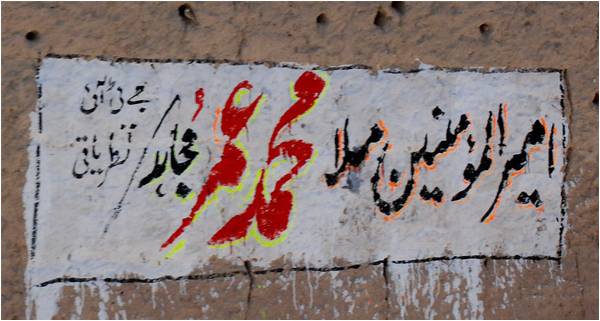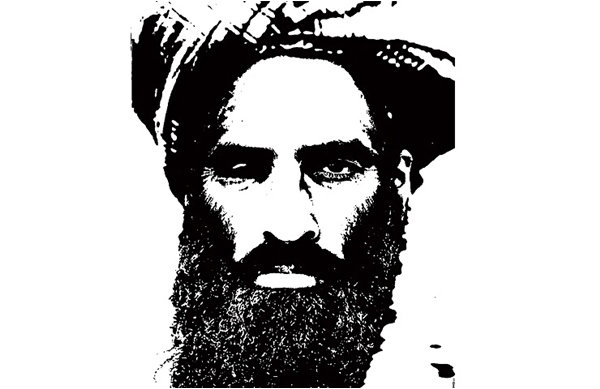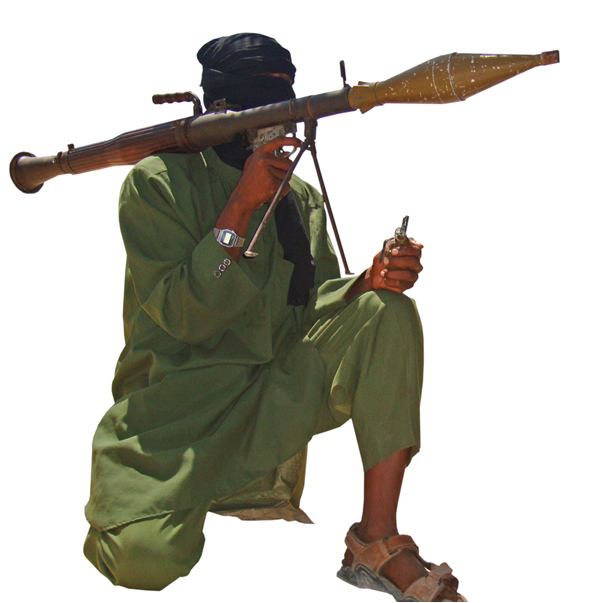
As Taliban leaders bicker over the future of their movement after the dramatic revelation that their founder and emir Mullah Muhammad Omar has died, a splinter group has further muddied the waters with the allegation that the charismatic but reclusive leader was killed by his successor Mullah Akhtar Mansoor.
“After sidelining Mullah Omar in 2010, Mullah Akhtar Mansoor became the de facto leader of the movement,” says Qari Hamza, the spokesman for Fidai Mahaz, or the Suicide Front. “No one had access to the emir apart from him and his cronies, and they did not consult him in their decision making. He poisoned Mullah Omar in 2013, but continued to give out statements in his name.”
The Taliban, who call themselves the Islamic Emirate of Afghanistan, deny the allegation, and say Mullah Omar had died because of an illness recently.

Fidai Mahaz, which does not support the Taliban’s peace talks with Kabul, was formed by Omar Khitab, a senior Taliban commander who left the ‘Islamic Emirate’ because he was against opening a Taliban office in Qatar. He was a close friend of Mullah Dadullah Akhund, a senior Taliban military commander who was killed by US and British forces in 2007. Omar Khitab had been a part of the Taliban since its rise in the 1990s, and was with Dadullah in the battle of Mazaar Sharif, when US troops were airlifted into the area in November 2001. There were rumors about his capture during the battle, but he escaped. With a belief in an eternal jihad, the Fidai Mahaz claims it has presence in the entire Afghanistan.
According to Qari Hamza, Mullah Omar had lost contact with the rest of the Taliban in 2010. When Mullah Baradar, then deputy leader of the Afghan Talibam was captured in Pakistan that year, Mullah Omar released an audio message condemning the Taliban for crossing over to Pakistan. “It was his last genuine audio message,” he says.
Then, he alleges, Mullah Akhtar Mansoor, Mullah Tayyeb Agha (the former head of Taliban’s political Shura), Mullah Gul Agha (former security in-charge of Mullah Omar), and Mullah Abdul Aziz conspired to seize power and began running the affairs of the movement. “They delivered fake messages to the Rahbari Shura” and “misused their power”, he claims.
Mullah Omar had never agreed to opening a liaison office in Qatar, says the Fidai Mahaz spokesman. After the heated debates that followed, they made a plan to assassinate him. “Mullah Omar was ill and used to take medicine. They replaced some of it with poison,” alleges Qari Hamza. “He died one week after taking it.”
Taliban’s media wing says Mullah Omar did not die until July 2015. “He became ill some time ago,” says a statement. “The illness intensified, and in two weeks he passed away.”
The Fidai Mahaz says Mullah Akhtar Mansoor appointed his aides on key positions in the Taliban, killed the fighters who were against his policies, and even collaborated with the Afghan intelligence and Iran against ISIS fighters in Afghanistan. The group says Mullah Akhtar Mansoor will soon be removed, and a group of 300 clerics is looking into the matter. “He cannot survive as the Taliban chief,” says Qari Hamza. “Taliban fighters cannot trust him.”
Another splinter group, the Dadullah Mahaz, has also come out strongly against the new Taliban emir. “Many fighting commanders like me were not consulted,” said Mansoor Dadullah, the head of the group, while taking to BBC radio’s Pashto service. “He was selected by a small group of people. We request the religious leaders of the country to pick a person who is acceptable to all.” Otherwise, he said, “there are chances of further friction”.

Mansoor Dadullah is against the peace talks sponsored by Pakistan. “Taliban have always been punished because of Pakistan,” he said. “The Afghans should decide their own fate, and should not rely on those who have always deceived them.”
The Islamic Movement of Uzbekistan (IMU) has already been divided into two groups, insiders say. “Musa Aaqa, who is leading Tahir Jan Yuldashev’s group, has pledged allegiance to Mullah Mansoor,” said a source, “and Abdul Aziz Yaldiv and his companions have joined the IS.”
Agha Jan Mutasim, a former Taliban finance minister and a senior member of the Shura, has also reportedly asked Mullah Akhtar Mansoor to “step down”, saying his appointment is illegal. Abdul Manan Niazi, another senior member of the Taliban Shura, said in a statement that he would support a leader with excellent knowledge of the Islamic Shariah and Afghan values, which the new emir lacks.
Meanwhile, the official Taliban website continues to carry reports of “scholars, saints, provincial Jihadi leaders, Mujahideen, tribal elders, influential figures and ordinary locals” pledging their allegiance to the new emir. On August 9, the website featured a pledge of allegiance by famous Taliban poet Faqir Muhammad Darwaish. “Being a sincere companion of the Ameerul Momineen (Mullah Omar), he qualifies to lead the movement,” he said. Darwaish also recorded a new poem in Pashto language praising Mullah Akhtar Mansoor.
Despite the support of the Taliban propaganda machinery, noted journalist Syed Wiqas Shah believes it will be “very difficult for Mansoor to get them unite under his leadership”. Shah is a television anchor and has vast experience of reporting in Afghanistan. “He will have to devolve his powers and create new posts, such as regional emirs,” he says. “But even then, the Afghan Taliban would prefer a person stationed in Afghanistan”. A number of Afghan Taliban leaders allege that the new head of the movement is hiding in Pakistan.
Tahir Ali is an Islamabad-based journalist
Twitter: @tahirafghan
“After sidelining Mullah Omar in 2010, Mullah Akhtar Mansoor became the de facto leader of the movement,” says Qari Hamza, the spokesman for Fidai Mahaz, or the Suicide Front. “No one had access to the emir apart from him and his cronies, and they did not consult him in their decision making. He poisoned Mullah Omar in 2013, but continued to give out statements in his name.”
The Taliban, who call themselves the Islamic Emirate of Afghanistan, deny the allegation, and say Mullah Omar had died because of an illness recently.

He poisoned Mullah Omar in 2013
Fidai Mahaz, which does not support the Taliban’s peace talks with Kabul, was formed by Omar Khitab, a senior Taliban commander who left the ‘Islamic Emirate’ because he was against opening a Taliban office in Qatar. He was a close friend of Mullah Dadullah Akhund, a senior Taliban military commander who was killed by US and British forces in 2007. Omar Khitab had been a part of the Taliban since its rise in the 1990s, and was with Dadullah in the battle of Mazaar Sharif, when US troops were airlifted into the area in November 2001. There were rumors about his capture during the battle, but he escaped. With a belief in an eternal jihad, the Fidai Mahaz claims it has presence in the entire Afghanistan.
According to Qari Hamza, Mullah Omar had lost contact with the rest of the Taliban in 2010. When Mullah Baradar, then deputy leader of the Afghan Talibam was captured in Pakistan that year, Mullah Omar released an audio message condemning the Taliban for crossing over to Pakistan. “It was his last genuine audio message,” he says.
Then, he alleges, Mullah Akhtar Mansoor, Mullah Tayyeb Agha (the former head of Taliban’s political Shura), Mullah Gul Agha (former security in-charge of Mullah Omar), and Mullah Abdul Aziz conspired to seize power and began running the affairs of the movement. “They delivered fake messages to the Rahbari Shura” and “misused their power”, he claims.
"He will have to devolve his power"
Mullah Omar had never agreed to opening a liaison office in Qatar, says the Fidai Mahaz spokesman. After the heated debates that followed, they made a plan to assassinate him. “Mullah Omar was ill and used to take medicine. They replaced some of it with poison,” alleges Qari Hamza. “He died one week after taking it.”
Taliban’s media wing says Mullah Omar did not die until July 2015. “He became ill some time ago,” says a statement. “The illness intensified, and in two weeks he passed away.”
The Fidai Mahaz says Mullah Akhtar Mansoor appointed his aides on key positions in the Taliban, killed the fighters who were against his policies, and even collaborated with the Afghan intelligence and Iran against ISIS fighters in Afghanistan. The group says Mullah Akhtar Mansoor will soon be removed, and a group of 300 clerics is looking into the matter. “He cannot survive as the Taliban chief,” says Qari Hamza. “Taliban fighters cannot trust him.”
Another splinter group, the Dadullah Mahaz, has also come out strongly against the new Taliban emir. “Many fighting commanders like me were not consulted,” said Mansoor Dadullah, the head of the group, while taking to BBC radio’s Pashto service. “He was selected by a small group of people. We request the religious leaders of the country to pick a person who is acceptable to all.” Otherwise, he said, “there are chances of further friction”.

Mansoor Dadullah is against the peace talks sponsored by Pakistan. “Taliban have always been punished because of Pakistan,” he said. “The Afghans should decide their own fate, and should not rely on those who have always deceived them.”
The Islamic Movement of Uzbekistan (IMU) has already been divided into two groups, insiders say. “Musa Aaqa, who is leading Tahir Jan Yuldashev’s group, has pledged allegiance to Mullah Mansoor,” said a source, “and Abdul Aziz Yaldiv and his companions have joined the IS.”
Agha Jan Mutasim, a former Taliban finance minister and a senior member of the Shura, has also reportedly asked Mullah Akhtar Mansoor to “step down”, saying his appointment is illegal. Abdul Manan Niazi, another senior member of the Taliban Shura, said in a statement that he would support a leader with excellent knowledge of the Islamic Shariah and Afghan values, which the new emir lacks.
Meanwhile, the official Taliban website continues to carry reports of “scholars, saints, provincial Jihadi leaders, Mujahideen, tribal elders, influential figures and ordinary locals” pledging their allegiance to the new emir. On August 9, the website featured a pledge of allegiance by famous Taliban poet Faqir Muhammad Darwaish. “Being a sincere companion of the Ameerul Momineen (Mullah Omar), he qualifies to lead the movement,” he said. Darwaish also recorded a new poem in Pashto language praising Mullah Akhtar Mansoor.
Despite the support of the Taliban propaganda machinery, noted journalist Syed Wiqas Shah believes it will be “very difficult for Mansoor to get them unite under his leadership”. Shah is a television anchor and has vast experience of reporting in Afghanistan. “He will have to devolve his powers and create new posts, such as regional emirs,” he says. “But even then, the Afghan Taliban would prefer a person stationed in Afghanistan”. A number of Afghan Taliban leaders allege that the new head of the movement is hiding in Pakistan.
Tahir Ali is an Islamabad-based journalist
Twitter: @tahirafghan

